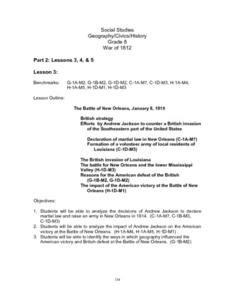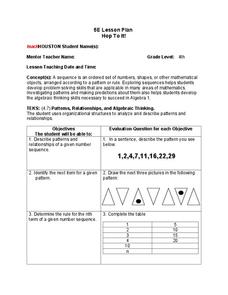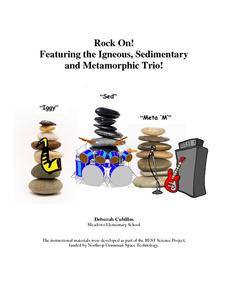Curated OER
War of 1812
Eighth graders locate the major land forms and bodies of water on a map of Louisiana. In groups, they discuss the role of the Mississippi River in the Battle of New Orleans and how land and water affect the outcome of battles. To end...
Curated OER
What are Igneous Rocks and How are They Formed?
Crystals form before your very eyes! What sixth grader wouldn't enjoy this lesson on igneous rock formation? Using hot Salol, junior geologists observe the crystal formation process as the material cools. This comprehensive lesson plan...
Curated OER
Water: From Neglect to Respect
The goal of this collection of lessons is to make middle schoolers more aware of the ways in which they are dependent upon water to maintain their standard of living. Learners compare water use in Lesotho to water use in the United...
Curated OER
Breaking it Down
High schoolers will identify the factors that contribute to erosion and weathering. They will start by differentiating between chemical and mechanical weathering. They then apply what they learned by playing the online jeopardy game. Key...
Discovery Education
Sonar & Echolocation
A well-designed, comprehensive, and attractive slide show supports direct instruction on how sonar and echolocation work. Contained within the slides are links to interactive websites and instructions for using apps on a mobile device to...
Consortium for Ocean Science Exploration and Engagement (COSEE)
Arctic Smorgasbord
Though the walrus spends roughly one third of its time on land, it eats organisms that live on the bottom of the ocean. The first in a series of five, the lesson uses a variety of plant and animal cards to have scholars build an arctic...
Curated OER
Evolution worksheet
Looking at evolution in detail, this thorough worksheet has complex questions requiring details and explanations of natural selection and diversity. Various examples of biological characteristics are available, and students choose the...
Curated OER
Hop To It!
Young scholars determine patterns. In this mathematics lesson, students act out a skit, play a sequence game, and complete patterns. Young scholars use problems solving skills.
Curated OER
The Airplane
Students demonstrate the Bernoulli Principle, review the influences that affected the Wright Brothers, and make and modify paper airplanes. This amazing lesson plan has an excellent structure, and very clear plans for the students to...
Curated OER
The Color Spectrum: How Does it Work?
Create models of the infrared, visible, and ultraviolet portions of the electromagnetic spectrum. Working in small groups, your class can investigate metric conversions calculations. They will find the length of the waves in nanometers,...
Curated OER
How Do You Light Up Your World?
A tremendous presentation on the properties of light. Young scientists are treated to slides which share a lot of fascinating information about light. This impressive PowerPoint is filled with great photos, graphics, and discussion...
Royal Society of Chemistry
Equilibria—Gifted and Talented Chemistry
Teaching is a balancing act! Keep things on an even keel with a comprehensive equilibrium lesson plan. The resource covers reversible and irreversible reactions, Le Chatelier's Principle, and the industrial applications of equilibrium...
Curated OER
Y-Intercept and Slope Intercept Form
Alegebra amateurs identify the slope and the y-intercept given a linear equation in slope-intercept form by correctly completing some in class problems. They write the linear equation in slope-intercept form that corresponds to the given...
Curated OER
Further Improvements of Writing Skills
Improve writing skills by finding a personal writing style, using descriptive language effectively, and using precise language. Middle schoolers discuss individual style in writing and formal and informal language. They utilize figures...
Curated OER
Rock On! Featuring the Igneous, Sedimentary and Metamorphic Trio!
Get your classroom rocking with this four-lesson earth science unit. Through a series of shared reading activities and hands-on investigations, young geologists learn about the three types of rocks and the unique properties of each.
Curated OER
Sippin' on Smoothies
Why is calcium good for the body? Where is it stored? Young chefs discover the importance of calcium and review a list of foods that are rich in the material. They then make delicious smoothies high in calcium! Teaching kids how to...
Cornell University
Catapults
Ready, aim, fire! Launch to a new level of understanding as scholars build and test their own catapults. Learners explore lever design and how adjusting the fulcrum changes the outcome.
Tech Museum of Innovation
Energy at Play
Get the ball rolling and challenge your class to figure out how to make a ball move. The instruction segment is between two STEM activities devoted to doing just that. The first is simple and involves making a ball move from some...
University of Wisconsin
What’s a Square Foot Anyway? Laying Out the Design Plan
Clever! Participants don square-foot cardboard shoes to mark out the rain garden plot that they have spent the last few weeks designing. In this way, they are practicing scale modeling as well! Note that this lesson is part of a unit,...
Curated OER
Animals and Humans
Young scholars identify the functions of various body parts. They participate in the "Head, Shoulders, Knees, and Toes" song, draw a picture of themselves and other mammals, and create a traced outline of their body that they add...
Teach Engineering
Density and Miscibility
The liquids did not mix — so what do density columns have to do with it? The seventh part in a series of nine provides the theoretical explanation of why density columns do not mix. The lesson covers the topics related to...
Curated OER
Liquid Rainbow
Students develop their own techniques for drawing a small sample of solutions into a straw. They hypothesize ways to increase the density of water, and discuss how salt-free rainwater tends to float on top of salty seawater.
Nevada Outdoor School
Let It Snow! Let It Melt!
Winter weather offers a great opportunity to teach young scientists about the states of matter. This activity-based lesson includes a range of learning experiences, from experimenting with the rate at which ice melts...
Virginia Department of Education
Classification of Organisms
Searching for the perfect indoor/outdoor activity that allows class members the opportunity to learn about organism classification? Here, pupils research organisms and categorize them according to domain and kingdom over the course...

























